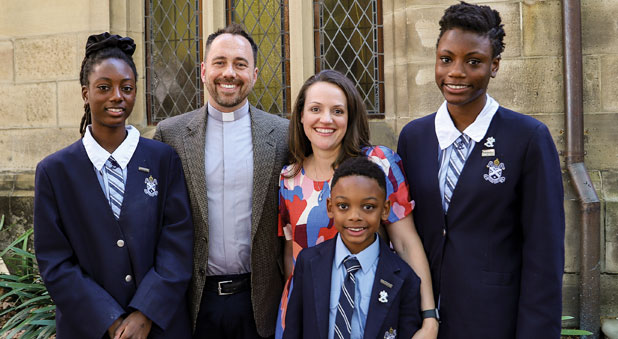I will never forget the night I became a foster carer. It was just after midnight on Maundy Thursday in 2018 when the social worker arrived with an 18-month-old boy who was scared, sick, and suffering from 12 fractures throughout his body as well as numerous cigarette burns on his forehead.
As I changed my first ever dirty nappy that night, I said half-jokingly, “Lord, I bet the disciples’ feet weren’t quite as bad as this.”
From there, we were off to the races as temporary carers of this child, tasked with all the normal things parents do: feeding, clothing, playing, teaching, dropping off and picking up, but with the added difficulty of special medical appointments, parental visits, social worker home inspections, learning to care for a child from a different cultural background, and the uncertainty of never knowing how long this arrangement would be in place.
It all got more complex three months later when we found out our foster son had two older half-sisters, aged 7 and 8, who needed placement. We couldn’t refuse the opportunity to give the girls a good home and to reunite the siblings, so a few days later there were three children in the house.
In our case, this temporary arrangement went on for nearly two years before, having exhausted every avenue for reunification or placement with kin, the agency asked us if we would be willing to consider adopting all three children. Of course, we said “Yes”, and today you can see all three children getting their education at St Andrew’s Cathedral School or coming forward for Holy Communion on Sundays at Darlinghurst.
They are wonderful, joyful children who are growing and developing, and have already overcome more than many men and women deal with in a lifetime. All they needed was safety and unconditional love.
According to a September 10 report in The Sydney Morning Herald, there are 15,000 children in the NSW child protection system. Some of them are in good foster homes, to be sure. But many are not, I assure you.
Increasingly, there just aren’t enough foster carers at all. A growing number of children are being placed into emergency care in hotels, motels and other group accommodations.
According to the Herald article, “The Department of Communities and Justice estimates that an extra 600 foster carers are needed each year to take care of children who cannot live safely at home”. Kate Washington, the NSW Minister for Families and Communities, is quoted as saying: “There are amazing foster and kinship carers right across NSW, but we desperately need more”.
There is a desperate need in our city and our state for more people who can welcome children into healthy homes. And my question is, who better than Sydney Anglicans? Who would we rather see do this work?
This isn’t something you can accomplish with laws or letters to your local member. This requires faith and hope and love in action. If we can’t do that, who can? If we won’t do it, who will?
With that in mind, here are some practical ways to champion foster care in your parish:
a. make people more aware of the need. Kids do not walk around with signs on them indicating that they are in foster care, and so the need can remain invisible if we don’t help people to see it.
b. We should help our congregations see something like foster care as a practical outworking of the gospel and ask them to consider whether it might be something they are called to. My wife Annie and I tried for years to have children naturally but couldn’t, and it was our Christian faith that led us to the conclusion that God was closing the womb so that we might open our home in a
different way.
c. We need to familiarise ourselves with, and to make familiar to others, the Anglicare resources that can help people go through the screening, training, and licensing process required to become a foster carer.
d. Think about foster care families as something for our wider parish can get behind. Foster care was, by far, the most difficult thing Annie and I have ever done, and I don’t think we could have got through it without the people in our previous parish, the Church of the Resurrection in Washington, DC. They prayed for us, cooked us meals, babysat our kids, paid for us to go on holiday and all sorts of other practical help. We couldn’t have done it without them, but it’s also true that it paid immense spiritual and relational dividends for the church.
e. Mark your parish calendar each year in September for Foster Carer and Kinship Week as a time to give special attention to this issue – to bring it before our people, to pray, and to celebrate those among us who open their homes in this special way.
The Rev Matthew Wilcoxen is the rector of St John’s, Darlinghurst. This is an edited version of a speech he gave at the recent diocesan Synod.






















